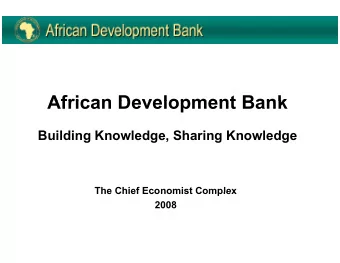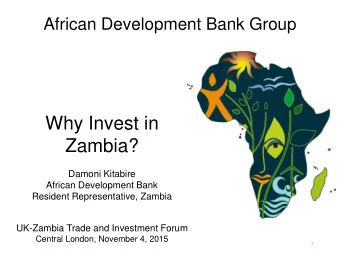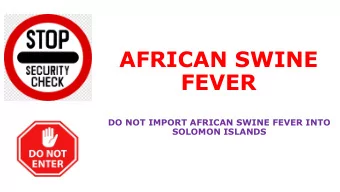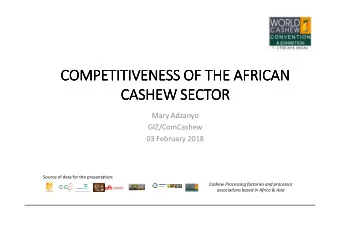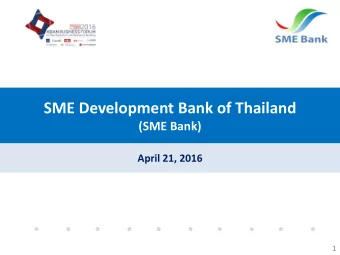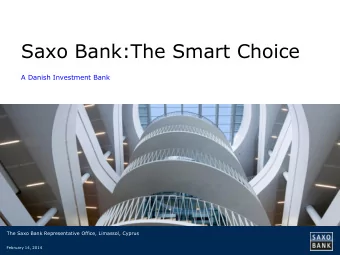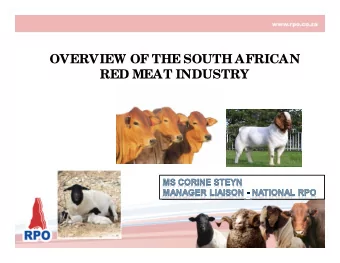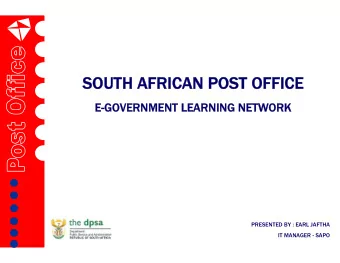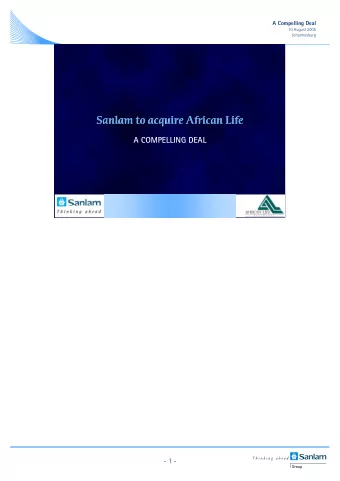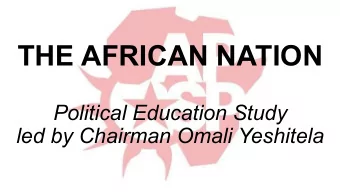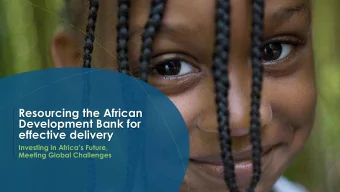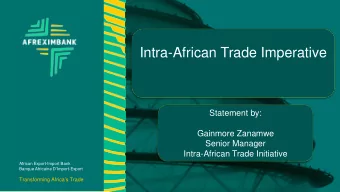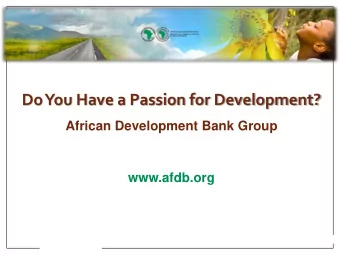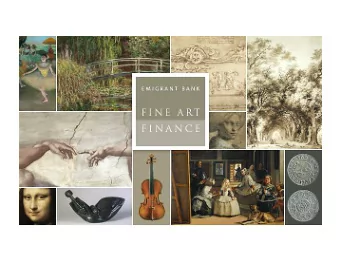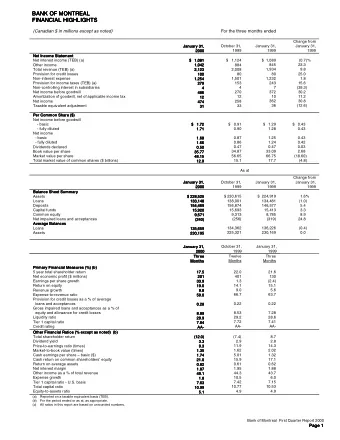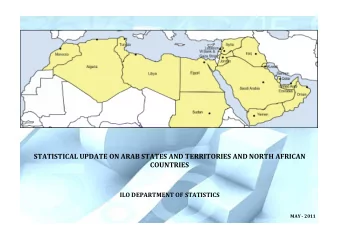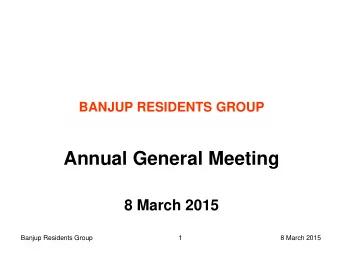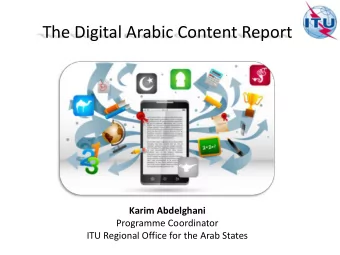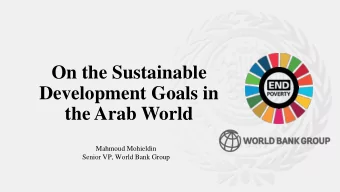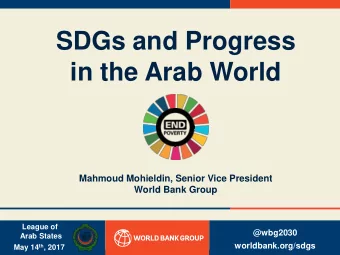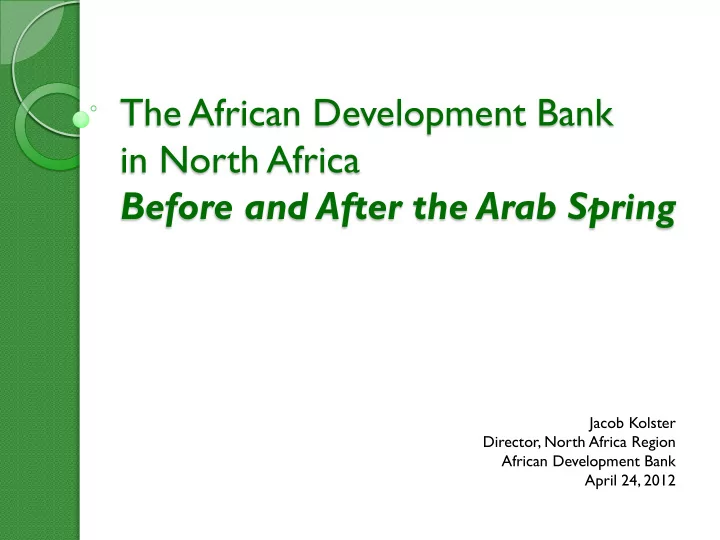
The African Development Bank in North Africa Before and After the - PowerPoint PPT Presentation
The African Development Bank in North Africa Before and After the Arab Spring Jacob Kolster Director, North Africa Region African Development Bank April 24, 2012 Outline A Brief Introduction to North Africa I. AfDB in North Africa II.
The African Development Bank in North Africa Before and After the Arab Spring Jacob Kolster Director, North Africa Region African Development Bank April 24, 2012
Outline A Brief Introduction to North Africa I. AfDB in North Africa II. The Arab Spring: Challenges & Opportunities III. IV. The Arab Spring: New Strategies & Partners The Deauville Partnership V. VI. Concluding Remarks
1. Brief Introduction to North Africa Some Basic Facts Tunisia Political Economy is changing Morocco Algeria • Structure of Economy: Resource rich – Diversified Libya Egypt • Transition Process: Bottom – Up (East) Mauritania Top-Down (West) Wealthiest Region in Africa Largest consumer market in Africa • Homogenous & fast growing population • Libya: High GDP/capita (USD10,000 ) • Algeria: High Reserves USD 184 • 170 million people (Egypt: 80 million) billion (36 months for import) • Sustained growth (2000-2010) • • Trade agreements Relatively high GDP before Revolution – expected to rebound • Growing Middle Class • Meeting most MDGs 3
I. Brief Introduction to North Africa Key Strengths • Top gas & oil producers Natural • Top phosphate and iron ore producers Ressources • Solar ( Energy & T ourism ) • Proximity to MENA & EU, Trade/Markets • Trade Agreements with EU and G8 • Growing trade / partnership with B RICs • Adequate transport infrastructure (which need to be sustained) Infrastructure • Communication infrastructure building up • Egypt & Morocco among top reformers Business • Governance issues to be overcome ? Climate • Free Trade Zones Human • Youth Bulge Capital • Cheap and relatively well educated labor 4
II. AfDB in North Africa Lending and Technical Assistance Tunisia Egypt Morocco Ongoing Operations Ongoing Operations Ongoing Operations • • • Total: $1.86 bill Total: $2.5 bill Total: $3.02 bill • • • Private $409 mill Private: $226 mill Private: $263 mill • • • TA: $7.6 mil TA: $7.75 mill TA: $9 mill Total Lending Accum : Total Lending Accum : Total Lending Accum : • $7.75 billion • $5.73 billion • $9.29 billion Mauritania Algeria Ongoing: $226 mill, $120 mill in Private Ongoing: $1,4 mill in TA Total Accum: : $775 mil Total Accum: $ 2.94 bill Total for NORTH AFRICA Ongoing operations : $7.65 bill of which $1.1 bill for Private Sector Operations Total Accumulated (1967-2011): $ 26 billion 5
II. AfDB in North Africa Growing Dialogue & Knowledge Agenda • 15 Country-specific ESW & diagnostic in 2011 Knowledge • Intensified socio-political & economic surveillance • Advisory support to Governments Dialogue • Frank dialogue with civil society & private sector • Lead role in international fora 6 6
II. AfDB in North Africa And on the Ground Regional Dept II Regional Dept I HQ in Tunis • Director: N.Matondo 2000 staff • Director: J.Kolster • No. of staff: 8 • No. of staff: 14 • Location: Tunis • Location: Tunis Tunisia Algeria Morocco Libya Egypt Mauritania Algeria Country Office Egypt Country Office Morocco Country Office • • • Res Rep: A.Diarra-Thioune Res Rep: S.Tapsoba Res Rep: A.Abou Zeid • • • No. of staff: 15 No. of staff: 14 No. of staff: 7 • • • Location: Alger Location: Cairo Location: Rabat
III. The Arab Spring Immediate Impact: Rising Borrowing Cost and Fall in FDI CDS trends in 2011 700 Egypt Adverse Reactions of Financial Markets 600 Morocco France Since January 2011, downgrades of T unisia 500 Germany (once) & Egypt (four times) 400 Egypt & Tunisia stock markets major negative 300 corrections 200 CDS rates triple for Egypt 100 Portfolio outflows and FDIs decline 0 Access to finance a major issue Stock markets in 2010 - 2012 Ratings as of March 2012 Maximum Number of S&P MOODY'S FITCH Downgrades In 2011 B B2 BB- 4 times EGYPT 4 notches negative negative negative BBB- Ba1 BBB- 0 Revolution in Tunisia MOROCCO stable stable stable 0 BBB- Baa3 BBB- 1 time 8 TUNISIA 1 notch negative negative negative
III. The Arab Spring Underlying Drivers & Challenges Exclusion & Growing Disparities • Voice & accountability • Transparency & financial management • Reversal in poverty & inequality • In-country regional disparities • Deteriorating public social services Lack of Jobs & Economic Transformation • Growth thru rise in capital & labor stock • Little TFP increase & income/capita growth < ½ % • Absorption of labor in public sector at its limit • Crisis of youth unemployment • A widening skills mismatch Production Sophistication Compared • Lack of econ sophistication & Egypt Tunisia Indonesia Malaysia transformation • No regional integration & myopic global integration 9 1975 2005
III. The Arab Spring Political Transition: Continuity and Change Continuity Macroeconomic stability Attract Investors Ensure a business-friendly agenda Agenda for greater competitiveness & diversification of exports T olerant to different cultures and religions Change Ensure social justice Set for inclusive growth Adhere to democracy Ensure voice, transparency & accountability Root out corruption and level the playing field 10
III. The Arab Spring From a private sector perspective Business-friendly policies • Policies – emphasis on attracting investment • Private-Sector led growth strategies • Job creation , SME & entrepreneurship Accountability - Governance aspects Transparency aspects • Competition & equal • Clearer procurement rules opportunities • Smarter regulation • Reduction in costs associated • Increased Information with doing business • Improved business • Main stakeholders’ environment participation in business-related • Repatriation of profits policies and regulations • Enforceability of contracts 11
IV. The Arab Spring & AfDB’s Response New ways of doing business Guarantees and risk alleviation Mobilise private funding New Instruments and Sources Mobilise grants for analysis and capacity building Souk at-Tanmiya Civil society and media Academic institutions and think tanks New Players & Labor unions & organizations Partners Strong partnerships – IFI coordination platform and beyond Consultations outside government, focus on voice & accountability New Ways and Stronger knowledge work Ideas T echnical assistance for nation re- engineering & building
IV. The Arab Spring & AfDB’s Response New Strategies & New Approaches New Strategies for Egypt, Morocco and Tunisia Tunisia Morocco Egypt Interim Strategy Strategy launched Interim Strategy under approved 02/15/12 04/03/12 preparation Preparation of NA Regional Integration Strategy Paper (2013-2017) Being Strategic in times of Change: Key Elements Scarce resources Uncertainty calls Transparency, Dialogue call for selectivity for flexibility & Communication and leverage Based on constant dialogue & regular review Appropriate balance of strategic intervention Diagnostic analysis & TA between immediate and options and priorities. long term goals support critical 13
V. The Deauville Partnership IFI Coordination Platform, Deauville Partnership Deauville Partnership • Egypt, Jordan, Morocco, Tunisia full Strengthen governance G8 members countries Develop economic & • Libya participate partly US chair in 2012 social inclusion Partnership Create jobs countries Support private sector Associated led growth 9 IFIs support IFIs countries countries Kuwait, Qatar, Advance regional/global under the Saudi Arabia, Platform economic integration UAE and Turkey pillar Secretariat : Platform objectives Information sharing Oucomes EBRD coming to the region Dialogue with partner • • Increased coordination via web-based info and countries activity platform joint projects, policy and • Targeted analytical work around key levers: analytical work (job creation and SMEs) Coordinate monitoring AfDB mobilizing grant resources for joint activities • and reporting 14
VI. Concluding Notes AfDB is a long-standing actor in the region • Support through financing, TA and capacity building since the 1960s • Strong presence on the ground We have a wide range of instruments • Sovereign Guaranteed Operations • Non sovereign Guaranteed Operations We have reacted swiftly to needs of the region • New strategies for Tunisia, Morocco and Egypt • More knowledge work and TA for national re-building We are working with new partners • EBRD & Deauville Partners • Civil Society, private sector, academia, independent pundits
Appendix I Tunisia Interim Country Strategy (2012-2013) Framework Flexibility Modalities Maintain Selectivity Creativity dialogue: Pillar I: Monthly meeting Growth and with the ministry economic transition Adaptability : Leverage Discussions Transparency throughout effect political calendar Pillar II: Inclusion and Following reduction of procedures: regional Advisory Mid-term review disparities Visibility services after one year 16
Recommend
More recommend
Explore More Topics
Stay informed with curated content and fresh updates.
